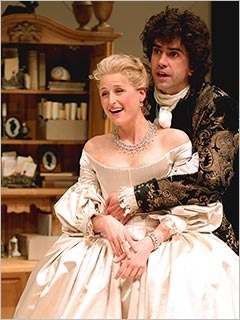Terry Teachout's Blog, page 236
May 11, 2011
TT: Snapshot
Evelyn Waugh talks to Elizabeth Jane Howard about the modern novel on Monitor, originally telecast by the BBC in 1964:
(This is the latest in a weekly series of arts-related videos that appear in this space each Wednesday.)
(This is the latest in a weekly series of arts-related videos that appear in this space each Wednesday.)
Published on May 11, 2011 05:00
TT: The whole eight minutes
If you're curious, the complete text of the commencement address I delivered last Saturday at Rollins College is
here
.
Published on May 11, 2011 05:00
TT: Almanac
"I have lately been reading both Joyce and Proust with considerable disappointment; they both seem to me very sick men, giant invalids who, in spite of enormous talent, were crippled by the same disease, elephantiasis of the ego. They both attempted titanic tasks, and both failed for lack of that dull but healthy quality without which no masterpiece can be contrived, a sense of proportion."
Cyril Connolly, "Comment" (Horizon, May 1941)
Cyril Connolly, "Comment" (Horizon, May 1941)
Published on May 11, 2011 05:00
May 10, 2011
TT: The beginning of the end of the beginning (or vice versa)
 I'm just about to wrap up my New York-based duties for the 2010-11 season. I finally caught up with Tony Kushner's
The Intelligent Homosexual's Guide to Capitalism and Socialism with a Key to the Scriptures
on Sunday afternoon, and last night I saw Lynn Nottage's
By the Way, Meet Vera Stark
. I have three Wall Street Journal columns to write this week. On Thursday I'm seeing New York City Ballet dance
The Seven Deadly Sins
, Lynne Taylor-Corbett's new Brecht-Weill ballet. On Friday Mrs. T and I go to Carnegie Hall to see Dawn Upshaw and the St. Paul Chamber Orchestra give the
New York premiere
of Maria Schneider's Carlos Drummond de Andrade Stories, conducted by the composer. We'll see an
exhibition
of Jane Freilicher's new paintings and prints on Saturday, and on Sunday we're going to try to catch
Win Win
.
I'm just about to wrap up my New York-based duties for the 2010-11 season. I finally caught up with Tony Kushner's
The Intelligent Homosexual's Guide to Capitalism and Socialism with a Key to the Scriptures
on Sunday afternoon, and last night I saw Lynn Nottage's
By the Way, Meet Vera Stark
. I have three Wall Street Journal columns to write this week. On Thursday I'm seeing New York City Ballet dance
The Seven Deadly Sins
, Lynne Taylor-Corbett's new Brecht-Weill ballet. On Friday Mrs. T and I go to Carnegie Hall to see Dawn Upshaw and the St. Paul Chamber Orchestra give the
New York premiere
of Maria Schneider's Carlos Drummond de Andrade Stories, conducted by the composer. We'll see an
exhibition
of Jane Freilicher's new paintings and prints on Saturday, and on Sunday we're going to try to catch
Win Win
.Come Monday morning we'll jump on a plane, fly to San Diego, and start our summer travels. Our first two weeks on the road are going to be fairly hectic: we're seeing Alan Ayckbourn's new play in San Diego, The Front Page , Porgy and Bess , and Heartbreak House in Chicago, and Stephen Sondheim's Follies at the Kennedy Center in Washington, D.C. Then we return to New York via Amtrak and take a few days off, the first real stretch of downtime that I've had in longer than I can easily recall.
I almost never plan to be as busy as I end up getting. I knew, for instance, that Danse Russe would be premiered at the tail end of the Broadway season, but it never occurred to me that the first half of the season would be so disastrous that the second half would be unnaturally hectic. Virtually all the shows that I reviewed in the fall had closed by the end of January and had to be replaced by new ones, not a few of which were rushed into Broadway theaters in order to qualify for this year's Tony Awards. Hence I saw five shows during one week in April, two of them (both musicals and bouh lousy) in one day. Had I known how crazy things would be in April, I would have made a point of taking two weeks off in May.
 I didn't, though, so I mean to approach the next two weeks with the best possible attitude. It helps--a lot--that I expect to enjoy all five of the shows that Mrs. T and I will be seeing. It helps, too, that we're visiting three cities that we both find highly agreeable, and since I have to set aside enough time along the way to write and file reviews for the Journal, we'll be sitting down in each city long enough to relax a bit, see a few sights, eat some good meals, and visit with an assortment of old friends, including our beloved Our Girl in Chicago.
I didn't, though, so I mean to approach the next two weeks with the best possible attitude. It helps--a lot--that I expect to enjoy all five of the shows that Mrs. T and I will be seeing. It helps, too, that we're visiting three cities that we both find highly agreeable, and since I have to set aside enough time along the way to write and file reviews for the Journal, we'll be sitting down in each city long enough to relax a bit, see a few sights, eat some good meals, and visit with an assortment of old friends, including our beloved Our Girl in Chicago.As usual, you'll be hearing from me along the way, so watch this space to keep up with the unfolding saga of the Traveling Teachouts.
Published on May 10, 2011 05:00
TT: And all must have prizes
The New York Drama Critics' Circle voted on its annual awards yesterday, and announced the results immediately after the meeting. To find out who won what and how we all voted, go
here
.
Two items for the record:
• I didn't vote for any of the winners.
• Our bylaws specify that after the first ballot, each member must vote for three shows in each category, regardless of whether that member believes there to be three shows worthy of a prize. Therein lies a dilemma: if you don't vote for three different shows, your vote(s) for the show(s) you did support won't be counted. Hence I "voted" for second- and third-place shows in the Best Foreign Play and Best Musical categories that I did not in fact support.
If you should go to the NYDCC website and look at the balloting, please don't draw any mistaken conclusions from my "votes" on the later ballots.
Two items for the record:
• I didn't vote for any of the winners.
• Our bylaws specify that after the first ballot, each member must vote for three shows in each category, regardless of whether that member believes there to be three shows worthy of a prize. Therein lies a dilemma: if you don't vote for three different shows, your vote(s) for the show(s) you did support won't be counted. Hence I "voted" for second- and third-place shows in the Best Foreign Play and Best Musical categories that I did not in fact support.
If you should go to the NYDCC website and look at the balloting, please don't draw any mistaken conclusions from my "votes" on the later ballots.
Published on May 10, 2011 05:00
TT: Almanac
"He had no wish to obliterate anything he had written, but he would dearly have liked to revise it, envying painters, who are allowed to return to the same theme time and time again, clarifying and enriching until they have done all they can with it. A novelist is condemned to produce a succession of novelties, new names for characters, new incidents for his plots, new scenery; but, Mr. Pinfold maintained, most men harbour the germs of one or two books only; all else is professional trickery of which the most daemonic of the masters--Dickens and Balzac even--were flagrantly guilty."
Evelyn Waugh, The Ordeal of Gilbert Pinfold
Evelyn Waugh, The Ordeal of Gilbert Pinfold
Published on May 10, 2011 05:00
May 8, 2011
TT: Almanac
"I read the newspapers with lively interest. It is seldom that they are absolutely, point-blank wrong. That is the popular belief, but those who are in the know can usually discern an embryo truth, a little grit of fact, like the core of a pearl, round which have been deposited the delicate layers of ornament."
Evelyn Waugh, Scoop
Evelyn Waugh, Scoop
Published on May 08, 2011 16:39
TT: Pride, hope, and bagpipes
 Over the weekend I flew down to Winter Park, Florida, to deliver the commencement address at Rollins College's
Hamilton Holt School
. Having spent the past two winters as a scholar-in-residence at the
Winter Park Institute
and given a half-dozen lectures and other public presentations at Rollins, I've become a modestly familiar face on campus, and Mrs. T and I now feel very much at home there. This, however, was the first time that I'd taken part in an official college function. It was also my first stint as a commencement speaker, as well as the first time that I'd been present at a graduation since I received my own college diploma some thirty-two years ago. Rollins, I found, puts on quite a show: not only was I decked out in full academic regalia, but the dignitaries with whom I shared the platform marched from the president's office to the auditorium, accompanied by a pair of kilted pipers. Rarely have I felt so regal.
Over the weekend I flew down to Winter Park, Florida, to deliver the commencement address at Rollins College's
Hamilton Holt School
. Having spent the past two winters as a scholar-in-residence at the
Winter Park Institute
and given a half-dozen lectures and other public presentations at Rollins, I've become a modestly familiar face on campus, and Mrs. T and I now feel very much at home there. This, however, was the first time that I'd taken part in an official college function. It was also my first stint as a commencement speaker, as well as the first time that I'd been present at a graduation since I received my own college diploma some thirty-two years ago. Rollins, I found, puts on quite a show: not only was I decked out in full academic regalia, but the dignitaries with whom I shared the platform marched from the president's office to the auditorium, accompanied by a pair of kilted pipers. Rarely have I felt so regal.My seat was directly behind that of Lewis Duncan , the president of Rollins College. This meant that I got a good look at all the students who received diplomas. I had no idea how moving an experience this would prove to be. The Holt School is Rollins' night-school division, the place where you go if you want to earn a college degree while holding down a full-time job. The men and women to whom I spoke ranged widely in age--one was in his seventies--but most of them were young enough to look like ordinary college graduates. Appearances, however, can be deceiving, for you have to work fearfully hard to get a diploma after hours, and each and every person to whom President Duncan said "Well done!" on Saturday morning had in fact done something for which the word "extraordinary" is far too mild. I've never seen so many proud and hopeful faces lined up in a row. I don't mind admitting that I teared up more than once as I listened to the cheers of the friends and family members who had come to celebrate their collective achievement.
What can you possibly say to such remarkable people on so auspicious an occasion? Here's part of what I told them. They seemed to like it, and I hope you do, too.
* * *
One more story and I'm done. Since I'm a drama critic, I'll make it a Broadway story. It's about Leland Hayward, who used to be a big Broadway producer. He was going to put on a play by Maxwell Anderson called Anne of the Thousand Days, and he asked Anderson who should play Henry VIII. Anderson gave it some thought, then he played it safe and suggested a good, solid actor with no flair, no panache.
 Hayward got red in the face, banged on the desk, and said, "No, no, Max! Suppose there were absolutely no problems in getting anyone in the world you wanted. Who would you pick?"
Hayward got red in the face, banged on the desk, and said, "No, no, Max! Suppose there were absolutely no problems in getting anyone in the world you wanted. Who would you pick?"Anderson didn't hesitate for a moment. He said, "Rex Harrison--but you'll never get him."
And Hayward grinned and said, "Why not ask him?" He picked up the phone and started placing calls, and an hour later, Rex Harrison had agreed to play Henry VIII.
Then Hayward hung up, grinned again, and said, "There's a lesson in this, Max. Never start out asking for someone you'd eventually settle for."
You see the point. If there's ever a time in life for you to shoot high, it's now. So take a long, cool look at yourself and say, What do I really want out of life? What would keep me interested until the day I die? Do I have a realistic chance to get it? And if you think you do, then go for it. Work as hard to get it as you worked to get your degree here. Settle later, if you must--but don't spend the rest of your life eating your heart out because you didn't give it your very best shot right now.
Published on May 08, 2011 16:39
May 5, 2011
TT: Almanac
"Writers are idolized not because they love their fellow men, which is never a recommendation and in extreme instances leads to crucifixion, but because their self-love is in tune with current fears and desires, and in giving it expression they are speaking for an inarticulate multitude."
Hugh Kingsmill, The Progress of a Biographer
Hugh Kingsmill, The Progress of a Biographer
Published on May 05, 2011 15:26
TT: Flying couplets and flying canapés
David Ives and the Classic Stage Company have a hit on their hands with
The School for Lies
, which I review in today's Wall Street Journal. Here's an excerpt.
* * *
When not writing plays of his own, David Ives writes plays based on the works of other men. Sometimes, as in his English-language version of Georges Feydeau's "A Flea in Her Ear" or the many musical-comedy books that he has freshened up for City Center's "Encores!" series, these are more or less straightforward adaptations meant to make the works on which they are based more accessible to modern audiences. "The School for Lies" is something else again, an uncategorizable rewrite of Molière's "The Misanthrope" in which Mr. Ives has done the seemingly impossible: He has taken a beloved masterpiece of Western theater and created a parallel version which, though unmistakably based on the original, is both wholly personal in tone and similarly dazzling in effect.
 At the center of both plays is a disillusioned curmudgeon (called Alceste by Molière and Frank--a nice touch--by Mr. Ives) who has resolved to tell the truth to everyone he meets, no matter how disconcerting or offensive they may find it. This being a comedy, Frank (Hamish Linklater) is diverted from his high-minded path by his love for Celimene (Mamie Gummer), an aristocrat with an equally sharp tongue. In "The School for Lies," though, Mr. Ives transplants into "The Misanthrope" the fully articulated plot that Molière eschewed, showing how Frank and Celimene fell for one another in the first place, in the process transforming what began life as a high comedy of bad manners into a slapstick-laden farce whose flavor is more Anglo-Saxon than French.
At the center of both plays is a disillusioned curmudgeon (called Alceste by Molière and Frank--a nice touch--by Mr. Ives) who has resolved to tell the truth to everyone he meets, no matter how disconcerting or offensive they may find it. This being a comedy, Frank (Hamish Linklater) is diverted from his high-minded path by his love for Celimene (Mamie Gummer), an aristocrat with an equally sharp tongue. In "The School for Lies," though, Mr. Ives transplants into "The Misanthrope" the fully articulated plot that Molière eschewed, showing how Frank and Celimene fell for one another in the first place, in the process transforming what began life as a high comedy of bad manners into a slapstick-laden farce whose flavor is more Anglo-Saxon than French.
All this is far more than clever enough--one expects no less from so accomplished a farceur--but what makes "The School for Lies" so memorable is its author's virtuosic use of language. Like "The Misanthrope," "The School for Lies" is written in rhyming couplets, and Mr. Ives, an amateur poet of no mean accomplishment, has got a million of 'em. What's more, it was his ingenious conceit to write his play not in a pastiche of pseudo-French circa 1666 (the year in which "The Misanthrope" was written and "The School for Lies" is set) but in a completely contemporary English that derives much of its sparkling charm from being pressed into the incongruously tight mold of iambic pentameter....
Brilliant though "The School of Lies" is, it's Walter Bobbie's apply-foot-A-to-banana-peel-B staging that makes the play take wing. Mr. Bobbie, who speaks Mr. Ives' idiosyncratic theatrical language fluently, is very much in tune with the high-low contrasts that drive "The School of Lies," and has put together a cast that pushes every comic button at all the right moments. Mr. Linklater froths with the violent hauteur of a man who does nothing but suffer fools all day long...
* * *
Read the whole thing here .
* * *
When not writing plays of his own, David Ives writes plays based on the works of other men. Sometimes, as in his English-language version of Georges Feydeau's "A Flea in Her Ear" or the many musical-comedy books that he has freshened up for City Center's "Encores!" series, these are more or less straightforward adaptations meant to make the works on which they are based more accessible to modern audiences. "The School for Lies" is something else again, an uncategorizable rewrite of Molière's "The Misanthrope" in which Mr. Ives has done the seemingly impossible: He has taken a beloved masterpiece of Western theater and created a parallel version which, though unmistakably based on the original, is both wholly personal in tone and similarly dazzling in effect.
 At the center of both plays is a disillusioned curmudgeon (called Alceste by Molière and Frank--a nice touch--by Mr. Ives) who has resolved to tell the truth to everyone he meets, no matter how disconcerting or offensive they may find it. This being a comedy, Frank (Hamish Linklater) is diverted from his high-minded path by his love for Celimene (Mamie Gummer), an aristocrat with an equally sharp tongue. In "The School for Lies," though, Mr. Ives transplants into "The Misanthrope" the fully articulated plot that Molière eschewed, showing how Frank and Celimene fell for one another in the first place, in the process transforming what began life as a high comedy of bad manners into a slapstick-laden farce whose flavor is more Anglo-Saxon than French.
At the center of both plays is a disillusioned curmudgeon (called Alceste by Molière and Frank--a nice touch--by Mr. Ives) who has resolved to tell the truth to everyone he meets, no matter how disconcerting or offensive they may find it. This being a comedy, Frank (Hamish Linklater) is diverted from his high-minded path by his love for Celimene (Mamie Gummer), an aristocrat with an equally sharp tongue. In "The School for Lies," though, Mr. Ives transplants into "The Misanthrope" the fully articulated plot that Molière eschewed, showing how Frank and Celimene fell for one another in the first place, in the process transforming what began life as a high comedy of bad manners into a slapstick-laden farce whose flavor is more Anglo-Saxon than French.All this is far more than clever enough--one expects no less from so accomplished a farceur--but what makes "The School for Lies" so memorable is its author's virtuosic use of language. Like "The Misanthrope," "The School for Lies" is written in rhyming couplets, and Mr. Ives, an amateur poet of no mean accomplishment, has got a million of 'em. What's more, it was his ingenious conceit to write his play not in a pastiche of pseudo-French circa 1666 (the year in which "The Misanthrope" was written and "The School for Lies" is set) but in a completely contemporary English that derives much of its sparkling charm from being pressed into the incongruously tight mold of iambic pentameter....
Brilliant though "The School of Lies" is, it's Walter Bobbie's apply-foot-A-to-banana-peel-B staging that makes the play take wing. Mr. Bobbie, who speaks Mr. Ives' idiosyncratic theatrical language fluently, is very much in tune with the high-low contrasts that drive "The School of Lies," and has put together a cast that pushes every comic button at all the right moments. Mr. Linklater froths with the violent hauteur of a man who does nothing but suffer fools all day long...
* * *
Read the whole thing here .
Published on May 05, 2011 15:26
Terry Teachout's Blog
- Terry Teachout's profile
- 45 followers
Terry Teachout isn't a Goodreads Author
(yet),
but they
do have a blog,
so here are some recent posts imported from
their feed.



